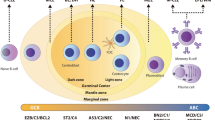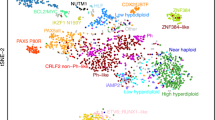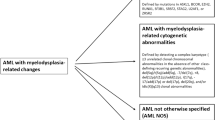Abstract
Myelodysplastic syndromes (MDS) are a heterogeneous group of clonal hematologic neoplasms, and the pathophysiology of these disorders is still unclear. Previous studies investigating the association between glutathione S-transferase Tl (GSTT1) null genotype and risk of MDS reported controversial results. We performed a comprehensive meta-analysis to clarify the effect of GSTT1 null genotype on risk of MDS. The strength of the association was measured by odds ratio (OR) with 95 % confidence interval (CI). Fifteen studies were finally included, involving a total of 1,796 cases and 2,502 controls. Subgroup analysis was performed by race. Meta-analysis of all 15 studies showed that the GSTT1 null genotype was significantly associated with an increased risk of MDS (OR = 1.47, 95 % CI 1.16–1.88, P OR = 0.002; I 2 = 54.4 %). Besides, an obvious association was also observed after adjusting the heterogeneity (OR = 1.32, 95 % CI 1.13–1.54, P OR = 0.001; I 2 = 9.0 %). Subgroup analysis by race suggested that this association existed in both Caucasians (OR = 1.40, 95 % CI 1.04–1.89, P OR = 0.027) and Asians (OR = 1.68, 95 % CI 1.00–2.81, P OR = 0.049). This meta-analysis suggests the GSTT1 null genotype is significantly associated with an increased risk of MDS in both Caucasians and Asians.




Similar content being viewed by others
References
Bejar R, Stevenson K, Abdel-Wahab O, Galili N, Nilsson B, Garcia-Manero G, et al. Clinical effect of point mutations in myelodysplastic syndromes. N Engl J Med. 2011;364:2496–506.
Graubert T, Walter MJ. Genetics of myelodysplastic syndromes: new insights. Hematol Am Soc Hematol Educ Program. 2011;2011:543–9.
Valent P, Orazi A, Busche G, Schmitt-Graff A, George TI, Sotlar K, et al. Standards and impact of hematopathology in myelodysplastic syndromes (MDS). Oncotarget. 2010;1:483–96.
Garcia-Manero G, Fenaux P. Hypomethylating agents and other novel strategies in myelodysplastic syndromes. J Clin Oncol. 2011;29:516–23.
Odenike O, Le Beau MM. The dawn of the molecular era of the myelodysplastic syndromes. N Engl J Med. 2011;364:2545–6.
Hahn CN, Chong CE, Carmichael CL, Wilkins EJ, Brautigan PJ, Li XC, et al. Heritable gata2 mutations associated with familial myelodysplastic syndrome and acute myeloid leukemia. Nat Genet. 2011;43:1012–7.
Strange RC, Spiteri MA, Ramachandran S, Fryer AA. Glutathione-S-transferase family of enzymes. Mutat Res. 2001;482:21–6.
Hayes JD, Flanagan JU, Jowsey IR. Glutathione transferases. Annu Rev Pharmacol Toxicol. 2005;45:51–88.
Hayes JD, Strange RC. Glutathione S-transferase polymorphisms and their biological consequences. Pharmacology. 2000;61:154–66.
Oakley A. Glutathione transferases: a structural perspective. Drug Metab Rev. 2011;43:138–51.
Li L, Yang L, Zhang Y, Xu Z, Qin T, Hao Y, et al. Detoxification and DNA repair genes polymorphisms and susceptibility of primary myelodysplastic syndromes in chinese population. Leuk Res. 2011;35:762–5.
Varkonyi J, Szakaly D, Janoskuti L, Hosszufalusi N, Panczel P, Karadi I, et al. Glutathione S-transferase enzyme polymorphisms in a Hungarian myelodysplasia study population. Pathol Oncol Res. 2008;14:429–33.
Stavropoulou C, Sambani C, Rigana H, Georgakakos VN, Voutsinas G, Manola KN, et al. Low frequency of the glutathione-S-transferase T1-null genotype in patients with primary myelodysplastic syndrome and 5q deletion. Leukemia. 2008;22:1643–6.
Arruda VR, Lima CS, Grignoli CR, de Melo MB, Lorand-Metze I, Alberto FL, et al. Increased risk for acute myeloid leukaemia in individuals with glutathione S-transferase mu 1 (GSTM1) and theta 1 (GSTT1) gene defects. Eur J Haematol. 2001;66:383–8.
Tsabouri SE, Georgiou I, Alamanos I, Bourantas KL. Increased prevalence of GSTM(1) null genotype in patients with myelodysplastic syndrome: a case–control study. Acta Haematol. 2000;104:169–73.
Sasai Y, Horiike S, Misawa S, Kaneko H, Kobayashi M, Fujii H, et al. Genotype of glutathione S-transferase and other genetic configurations in myelodysplasia. Leuk Res. 1999;23:975–81.
Preudhomme C, Nisse C, Hebbar M, Vanrumbeke M, Brizard A, Lai JL, et al. Glutathione S transferase theta 1 gene defects in myelodysplastic syndromes and their correlation with karyotype and exposure to potential carcinogens. Leukemia. 1997;11:1580–2.
Okada M, Okamoto T, Wada H, Takemoto Y, Kakishita E. Glutathione S-transferase theta 1 gene (GSTT1) defect in Japanese patients with myelodysplastic syndromes. Int J Hematol. 1997;66:393–4.
Basu T, Gale RE, Langabeer S, Linch DC. Glutathione S-transferase theta 1 (GSTT1) gene defect in myelodysplasia and acute myeloid leukaemia. Lancet. 1997;349:1450.
Atoyebi W, Kusec R, Fidler C, Peto TE, Boultwood J, Wainscoat JS. Glutathione S-transferase gene deletions in myelodysplasia. Lancet. 1997;349:1450–1.
Chen H, Sandler DP, Taylor JA, Shore DL, Liu E, Bloomfield CD, et al. Increased risk for myelodysplastic syndromes in individuals with glutathione transferase theta 1 (GSTT1) gene defect. Lancet. 1996;347:295–7.
DerSimonian R, Laird N. Meta-analysis in clinical trials. Control Clin Trials. 1986;7:177–88.
Mantel N, Haenszel W. Statistical aspects of the analysis of data from retrospective studies of disease. J Natl Cancer Inst. 1959;22:719–48.
Higgins JP, Thompson SG, Deeks JJ, Altman DG. Measuring inconsistency in meta-analyses. BMJ. 2003;327:557–60.
Galbraith R. A note on graphical presentation of estimated odds ratios from several clinical trials. Stat Med. 1988;7:889–94.
Fabiani E, D’Alo F, Scardocci A, Greco M, Di Ruscio A, Criscuolo M, et al. Polymorphisms of detoxification and DNA repair enzymes in myelodyplastic syndromes. Leuk Res. 2009;33:1068–71.
Haase D, Binder C, Bunger J, Fonatsch C, Streubel B, Schnittger S, et al. Increased risk for therapy-associated hematologic malignancies in patients with carcinoma of the breast and combined homozygous gene deletions of glutathione transferases M1 and T1. Leuk Res. 2002;26:249–54.
Davies SM, Robison LL, Buckley JD, Radloff GA, Ross JA, Perentesis JP. Glutathione S-transferase polymorphisms in children with myeloid leukemia: a Children’s Cancer Group study. Cancer Epidemiol Biomarkers Prev. 2000;9:563–6.
Yang L, Zou X, Zhang M, Zhang Y, Hao Y, Xiao Z. Investigation of GSTT1, GSTM1 and NQO1 genes polymorphisms in myelodysplastic syndromes. Chin J Hematol. 2005;26:674–7 [article in Chinese].
Kulasekararaj AG, Smith AE, Mian SA, Mohamedali AM, Krishnamurthy P, Lea NC, et al. Tp53 mutations in myelodysplastic syndrome are strongly correlated with aberrations of chromosome 5, and correlate with adverse prognosis. Br J Haematol. 2013;160:660–72.
Otrock ZK, Tiu RV, Maciejewski JP, Sekeres MA. The need for additional genetic markers for myelodysplastic syndrome stratification: what does the future hold for prognostication? Expert Rev Hematol. 2013;6:59–68.
Wang B, Huang G, Wang D, Li A, Xu Z, Dong R, et al. Null genotypes of GSTM1 and GSTT1 contribute to hepatocellular carcinoma risk: evidence from an updated meta-analysis. J Hepatol. 2010;53:508–18.
Wei Y, Zhou T, Lin H, Sun M, Wang D, Li H, et al. Significant associations between GSTM1/GSTT1 polymorphisms and nasopharyngeal cancer risk. Tumour Biol. 2013;34:887–94.
Yang Q, Du J, Yao X. Significant association of glutathione S-transferase T1 null genotype with prostate cancer risk: a meta-analysis of 26,393 subjects. PLoS One. 2013;8:e53700.
Dahabreh IJ, Giannouli S, Gota V, Voulgarelis M. GSTT1 and GSTM1 polymorphisms and myelodysplastic syndrome risk: a systematic review and meta-analysis. Int J Cancer. 2010;126:1716–23.
Conflicts of interest
None
Author information
Authors and Affiliations
Corresponding author
Rights and permissions
About this article
Cite this article
Fang, M., Zeng, W., Huang, L. et al. Association between glutathione S-transferase T1 null genotype and risk of myelodysplastic syndromes: a comprehensive meta-analysis. Tumor Biol. 34, 2747–2752 (2013). https://doi.org/10.1007/s13277-013-0828-6
Received:
Accepted:
Published:
Issue Date:
DOI: https://doi.org/10.1007/s13277-013-0828-6




